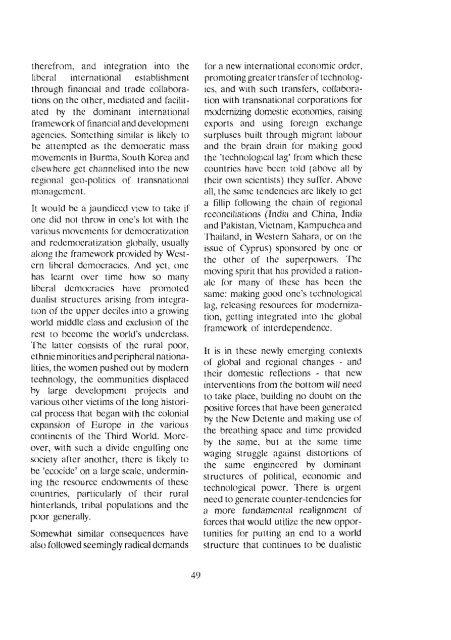ifda dossier 74 - Dag Hammarskjöld Foundation
ifda dossier 74 - Dag Hammarskjöld Foundation
ifda dossier 74 - Dag Hammarskjöld Foundation
Create successful ePaper yourself
Turn your PDF publications into a flip-book with our unique Google optimized e-Paper software.
therefrom, and integration into the<br />
liberal international establishment<br />
through financial and trade collabora-<br />
tions on the other, mediated and facilit-<br />
ated by the dominant international<br />
framework of financial and development<br />
agencies. Something similar is likely to<br />
be attempted as the democratic mass<br />
movements in Hurma, South Korea and<br />
elsewhere gct channelised into the new<br />
regional gco-politics of transnational<br />
man;igen1eent.<br />
It would be a jaundiced view to take if<br />
one did not throw in one's lot with the<br />
various movements for den~ocratization<br />
and reden~ocratization globally, usually<br />
along the framework provided by West-<br />
ern liberal democracies. And yet, one<br />
has learnt over time how so many<br />
liberal democracies have promoted<br />
dualist structures arising from ii~tcgra-<br />
lion of the upper deciles into a growing<br />
world middle class and exclusion of the<br />
rest to become the world's underclass.<br />
'lhe latter consists of the rural poor,<br />
ethnicminorities and peripheral nationa-<br />
lities, the women pushed out by modern<br />
technology, the comn1unities displaced<br />
by large development projects and<br />
various other victims of the long histori-<br />
cal process that began with the colonial<br />
expansion of Europe in the various<br />
continents of the Third World. More-<br />
over, with such a divide engulfing one<br />
society after another, there is likely to<br />
be 'ecocide' on a large scale, undermin-<br />
ingthe resource endowments of these<br />
countries, particularly of their rural<br />
hinterlands, tribal populations and the<br />
poor generally.<br />
Somewhat similar consequences have<br />
also followed seemingly radical demands<br />
for a new international economic order,<br />
promoting greater transfer of technolog-<br />
ies, and with such transfers, collabora-<br />
tion with transnational corporations for<br />
modernizing domestic economies, raising<br />
exports and using foreign exchange<br />
surpluses built through migrant labour<br />
and the brain drain for makingggood<br />
the 'technological la$ from which these<br />
countries have been told (above all by<br />
their own scientists) they suffer. Above<br />
all, the same tendencies are likely to get<br />
a fillip following the chain of regional<br />
reconciliations (India and China, India<br />
and Pakistan, Vietnam, Kampuchea and<br />
Ihtiiland, in Western Sahara, or on the<br />
issue of Cyprus) sponsored by one or<br />
the other of the superpowers. 'Ihe<br />
moving spirit that has provided a ration-<br />
ale for many of these has been the<br />
same: making good one's technological<br />
la" releasing resources for moderniza-<br />
tion, getting integrated into the global<br />
framework of interdependence.<br />
It is in these newly emerging contexts<br />
of global and regional changes - and<br />
their domestic reflections - that new<br />
interventions from the bottom will need<br />
to take place, building no doubt on the<br />
positive forces that have been generated<br />
by the New Detente and making use of<br />
the breathing space and time provided<br />
by the same, but at the same time<br />
waging struggle against distortions of<br />
the same engineered by dominant<br />
structures of political, econon~ic and<br />
technological power. 'I'here is urgent<br />
need to generate counter-tendencies for<br />
a more fundamental realignment of<br />
forces that would utilize the new oppor-<br />
tunities for putting an end to a world<br />
structure that continues to be dualistic
















